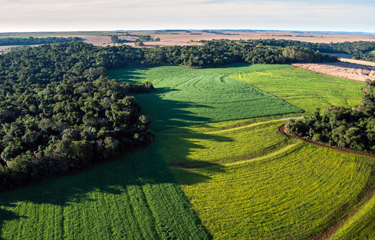Political instability and a dearth of resources is affecting Brazil’s ability to regulate its soybean sector, an investigation by Aarhus, Denmark-based aquafeed firm BioMar has found.
The company initiated its investigation following a report issued by the Rainforest Foundation and the non-governmental organization Future in our Hands that implicated Brazilian soybean producers Caramuru, Selecta, and Imcopa of alleged illegal deforestation, violent and illegal seizures of land, and of using illegal pesticides and slave labor.
BioMar has traded with all three of the accused companies, company vice president Jan Sverre Røstad acknowledged in response to the October 2018 release of the report. Brazil is one of the few countries where it can source soybeans that are not genetically modified – a legal requirement in Norway, where the company has significant operations.
In a 10 April statement, BioMar said company representatives had completed a fact-finding mission in Brazil ascertained its own suppliers of non-GMO certified soy are in full compliance with Brazilian law.
BioMar discovered “no intent or negligence on the part of its Brazilian suppliers in being complicit with environmental or social crimes,” it said.
However, BioMar’s delegation, which consisted of its audit team and a member of its sustainability department, found that while Brazil has in place “a robust legal framework in place to promote forest conservation and human rights,” it is at times being undermined by inadequate resources being channeled to regulatory and enforcement agencies.
“While BioMar can confirm that their suppliers of non-GMO, certified soy are in legal compliance, nationwide efforts to combat illegal labor practices and ‘pirate soy’ are hampered by the political climate and lack of resources in key areas,” the company said. “Despite an impressive legal framework for forest conservation and human rights, BioMar found that effective enforcement and implementation of key legislation by government agencies is hampered by the sheer size of the country, unstable political climate, and the lack of resources in key areas.”
Several projects are in the works that hold promise to improve the environmental situation in Brazil, the company said. One, “Responsible Sourcing of Soy, Cattle and Palm Oil,” which is led by sustainability nonprofit NEPCon and agricultural consutancy SEGES and funded by the Ministry of Foreign Affairs of Denmark, is building a tool to conduct assessments to help companies minimize social and environmental risks when sourcing commodities from Brazil.
“The NEPCon project improved BioMar’s ability to understand the complexities of legal compliance with environmental and human rights law in South America, including Brazilian laws pertaining to deforestation and human rights," the company said. “Learnings from this project have been implemented into BioMar’s BioSustain program so every customer can receive an impact assessment which not only assesses soy, but every raw material in any recipe.”
A separate tool, AgroTools, uses is high-definition satellite technology and number-crunching software to detect “pirate soy” by comparing theoretical yields of an area to reported harvest data. The tool will help prevent soy grown in illegal deforested areas being mixed with legally-produced soy, BioMar said.
“We will continue to work with leading environmental organizations to find the best solutions and tools for all the raw materials we source,” BioMar CEO Carlos Diaz said. “Regular audits will continue with all our suppliers including Brazilian soy producers and we will soon be releasing our new sourcing policy which will continue to drive responsible production in our value chain.”







